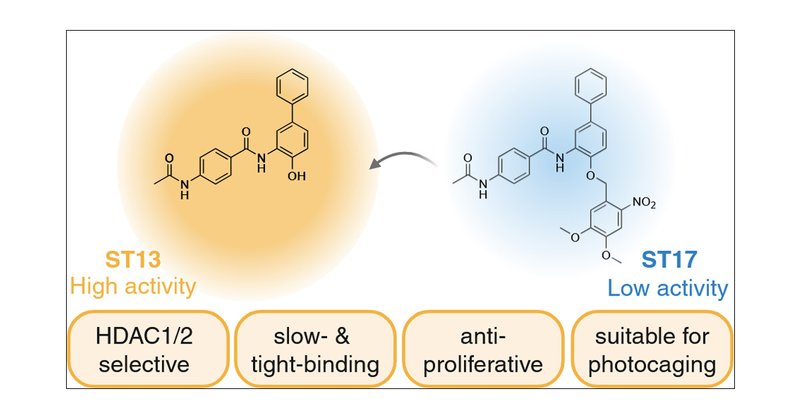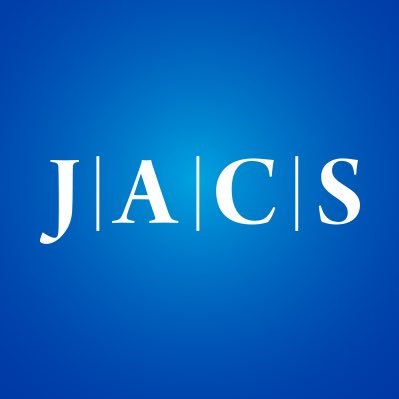
Finn K. Hansen
@FKH_Lab
Followers
609
Following
1K
Media
10
Statuses
579
Professor of Pharmaceutical Chemistry at University of Bonn, Germany. Vice speaker of @GRK2873.
Bonn, Deutschland
Joined March 2018
Happy to share our newest paper. Congrats to first author Irina! Slow-Acting HDACi are still puzzling!!! Congrats also to Tao, Nisha and Linda for their important controbutions to this project. https://t.co/UahgzkwoA7
pubs.acs.org
Histone deacetylases (HDACs) regulate gene expression and are promising targets in oncology. Especially the class I isoforms HDAC1 and HDAC2 are overexpressed in cancer. However, while ortho-aminoa...
0
0
5
Happy to share our publication dealing with the targeted #HDAC degradation via direct DDB1 recruitment. Congrats to first author Shiyang @Vincent_SYZ and everybody involved. Great collaboration with the Geyer lab @Geyer_lab! #BonnTPD
pubs.acs.org
Targeted protein degradation using proteolysis-targeting chimeras (PROTACs) has emerged as a powerful strategy for disease treatment. By recruiting E3 ligases, these molecules enable selective...
2
1
10
Happy to share the latest publication from my lab: we developed a NanoBRET based target engagement assay for HDAC6. Furthermore this system allows to track the HDAC6 degradation by PROTACs in real-time. Congrats to my postdoc Maria and everybody involved. https://t.co/gQrRmdyU00
pubs.acs.org
Histone deacetylase 6 (HDAC6) is an important drug target for the treatment of cancer, inflammation, and neurodegenerative disorders. In recent years, the development of proteolysis-targeting...
1
2
22
Enhancing Solubility in VHL-Based PROTACs: Optimized USP7 Degraders for Improved Developability | Journal of Medicinal Chemistry
pubs.acs.org
Limited aqueous solubility, high total polar surface area (TPSA), and high hydrogen-bond donor (HBD) counts have hampered the clinical development of VHL-based proteolysis-targeting chimeras (PROTA...
2
4
18
Happy to see our dual HDAC6/10 #PROTAC paper out in #JMedChem. I am extremely proud of my PhD student Shiyang @Vincent_SYZ for making this possible. Huge thanks to all collaborators and co-workers for their amazing contributions!
pubs.acs.org
Proteolysis-targeting chimeras (PROTACs) are emerging new therapeutic modalities that facilitate the targeted degradation of disease-relevant proteins via an event-driven mode of action. In this...
1
1
18
Thrilled to see Our FerroTac story is now out at @J_A_C_S - Huge congrats 🙌🏻 🥳 @ales_salerno Lianne and Claudia! @UoDCeTPD
Rational Design of PROTAC Linkers Featuring Ferrocene as a Molecular Hinge to Enable Dynamic Conformational Changes | Journal of the American Chemical Society @alessiociulli @Dundeeuni @UoDCeTPD. @AmphistaThera
2
5
42
#ChemMedChem Replacing a Cereblon Ligand by a DDB1 and CUL4 Associated Factor 11 (DCAF11) Recruiter Converts a Selective Histone Deacetylase 6 PROTAC into a Pan-Degrader (Finn K. Hansen and co-workers) #openaccess 🔓
chemistry-europe.onlinelibrary.wiley.com
This study introduced DCAF11 as an E3 ligase for PROTAC-mediated histone deacetylase (HDAC) degradation. By replacing cereblon with DCAF11 as recruited E3 ligase, a selective HDAC6 degrader (A6) was...
0
3
8
Happy to share the final version of our DCAF11-recruiting #HDAC #PROTAC paper. Congrats to my co-workers Felix @fellerflix, Heiko, Martina, Irina and Maria!
chemistry-europe.onlinelibrary.wiley.com
This study introduced DCAF11 as an E3 ligase for PROTAC-mediated histone deacetylase (HDAC) degradation. By replacing cereblon with DCAF11 as recruited E3 ligase, a selective HDAC6 degrader (A6) was...
0
3
18
The next chapter of our HDAC #PROTAC story: CRBN-recruiting PROTACs based on a non-selective ethylhydrazide #HDAC warhead induce selective HDAC6 degradation. Congrats to my PhD students Daniel @danicious & Irina (co-first authors), and Felix @fellerflix.
pubs.acs.org
Histone deacetylases (HDACs) are promising targets for epigenetic drug discovery. Additionally, targeted degradation of HDACs has emerged as a novel approach in medicinal chemistry and chemical...
0
4
18
Thrilled to share our #JMedChem paper dealing with DS-103! The ethylhydrazide DS-103 fully reverses cisplatin resistance and binds to HDAC6 in a manner similar to a hydroxamate. Huge congrats to first authors Daniel @danicious & Lukas and the entire team!
pubs.acs.org
In this work, we synthesized a series of peptoid-based histone deacetylase (HDAC) inhibitors with variations in the linker region and zinc-binding groups. All compounds were investigated for their...
0
3
19
Happy to share our latest paper in #JMedChem on improved antagonists targeting the intracellular allosteric binding site of CCR7! Huge thanks and congratulations to the whole team for the incredible teamwork!
pubs.acs.org
Intracellular ligands of G protein-coupled receptors (GPCRs) are gaining significant interest in drug discovery. Here, we report the development of the fluorescent ligand Mz437 (4) targeting the CC...
0
3
15
Excited to share our latest publication on #HDAC inhibitor-based multineurotarget drugs as a potential treatment option for Alzheimer´s disease, now online in ACS Pharmacology & TS! 🎉 Huge congrats to our amazing team and collaborators!
pubs.acs.org
In this work, we designed, synthesized, and evaluated two types of multineurotargeting compounds using a pharmacophore merging strategy, aiming to develop potential treatments for Alzheimer’s...
1
3
35
New #PROTAC preprint: In this work, we utilized a non-selective ethyl hydrazide warhead for the selective HDAC6 degradation. Congratulations to co-first authors Daniel @danicious & Irina as well as Felix @fellerflix !
0
2
20
Kicking of the new year with our first publication: Our paper dealing with FEM1B-recruiting HDAC #PROTACs is online in #JMedChem @ACSBioMed. We noticed selective HDAC1-3 degradation. Congrats to Felix @fellerflix, Irina, Martina, Heiko, Svenja and Maria!
pubs.acs.org
Targeted protein degradation (TPD) represents a promising alternative to conventional occupancy-driven protein inhibition. Despite the existence of more than 600 E3 ligases in the human proteome, so...
2
7
41
The application period for the second cohort of our RTG 2873 @grk2873 is open! We are now recruiting 12 PhD students. For more information see our homepage: https://t.co/JJeVBK2tvX. My own project will focus on the development of HDAC #PROTACs. Please RT!
grk2873.uni-bonn.de
Medicinal Chemistry is a highly interdisciplinary field of research that focuses on the discovery, characterization and development of bioactive tool compounds and drugs. In recent years, the target...
0
2
8
Let´s continue our E3 ligase hopping party! Second stop: DCAF11. The switch from a CRBN to a DCAF11 recruiter converts a selective HDAC6 PROTAC into a pan-degrader. Congrats to first author Felix @fellerflix and my coworkers Heiko, Martina, Irina & Maria!
0
3
19
Check out our latest preprint on #PHOTACs: Light-activatable PHOTACs enable the optical control of targeted HDAC6 degradation. Huge congrats to Silas @WurnigSilas , Maria, Shiyang @Vincent_SYZ , and our amazing collaborators in the Nowak lab @RPNowak !
0
2
17
Happy to announce that our paper on the multicomponent synthesis of quisinostat analogs as anticancer and antiplasmodial #HDAC inhibitors has been published. Congratulations to first author Daniel @danicious and all co-workers and collaborators involved!
0
0
19
I stood in line for 3 hours to vote today! 🇺🇸 It’s a small price to pay for democracy and our right to have a voice. Voting is more than a duty; it’s a privilege. Let’s participate, make our voices heard, and respect the outcome, whatever it may be.
0
2
12















